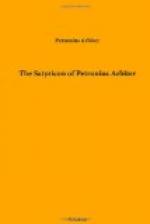A detailed account of him, which must be divinely inspired since there is no human material for it, has been made popular in the last half-century by the author—a foreign gentleman, whose name for the moment escapes me—of a novel entitled Quo Vadis. Fond as he must have been of oysters, there is no evidence that Petronius ever visited England, but it should be borne in mind that the law for which he is generally regarded as showing insufficient respect was not enacted here until more than eighteen hundred years after his death. Moreover, suicide, the one offence with which he is definitely charged, was not in his or his contemporaries’ eyes the horrid felony which, I hope, it will always be in yours. That his work—of which this volume forms but a fragmentary part—had made its way into this country, with unusual rapidity, in little more than ten centuries from its publication, is shown by its being frequently quoted by the English churchman John of Salisbury, the pupil of Abelard and friend and biographer of Becket (the Saint, not the boxer), who died (as Bishop of Chartres) in the year 1180. We may suppose that John took a copy of the Satyricon home with him from Paris, as undergraduates do to-day from Oxford and Cambridge. Two and a half centuries later, in 1423 (I owe this display of erudition to Mr. Gaselee’s collotype reproduction of the Trau manuscript), Poggio writes to Niccolo Niccoli that he has received from Cologne a copy recently ordered by him, of the fifteenth book of Petronius, and asks his friend to return the extract from Petronius “which I sent you from Britain.” This last, Mr. Gaselee spiritedly assumes, was the part known as Cena Trimalchionis (pages 41 to 118 in this volume) from which John of Salisbury makes three separate quotations, but which is not otherwise on record before the discovery of what may have been Poggio’s own manuscript (for it also is dated 1423) at Trau in Dalmatia, in the middle of the seventeenth century.
This manuscript is described as “Fragments from the Fifteenth and Sixteenth Books of the Satire of Petronius Arbiter”; we may assume, therefore, that the whole Satire was immensely long, a life-work, like Marcel Proust’s A la Recherche du Temps Perdu, and like that work, perhaps, fatal to its author. Indeed, since Proust’s death last year the two have frequently been compared, and on more than the mere alliterative ground that is in their names. Of Petronius we are told “illi dies per somnum, nox officiis et oblectamentis vitae transigebatur; utque alios industria, ita hunc ignavia ad famam protulerat, habebaturque non ganeo et profligator, ut plerique sua haurientium, sed erudito luxu. Ac dicta factaque eius quanto solutiora et quandam sui negligentiam praeferentia, tanto gratius in speciem simplicitatis accipiebantur.” So far, this describes Proust also, and the similarity extends to their work. In connexion with Proust’s, one of our youngest critics, your contemporary rather




